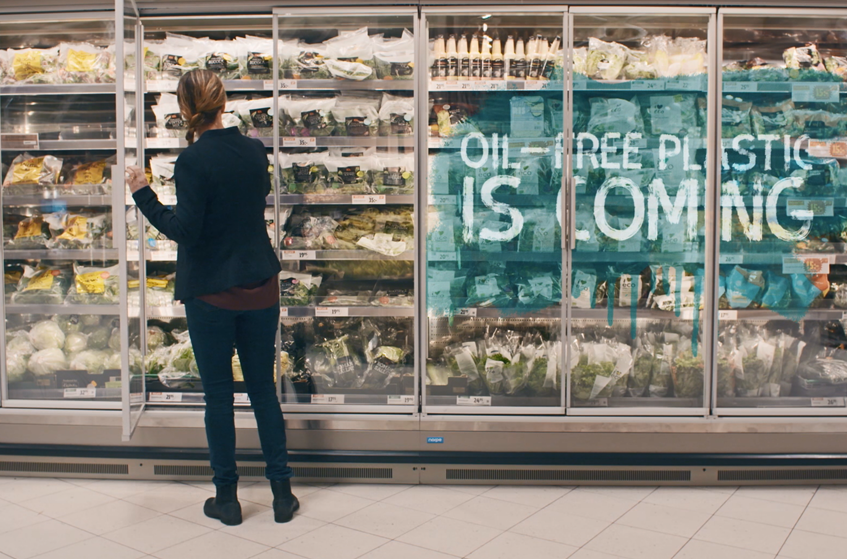
Food retail sector
There are many aspects of the food retail sector’s operations that affect the climate and the environment. One important and high-priority question is phasing out fossil and non-recyclable plastic packaging, which was selected as the theme of the roadmap.
Today the industry uses approximately 220,000 tonnes of plastic for packaging. The majority of the collected plastic, about 72 percent, goes for energy recovery instead of material recycling. Material recycling accounts for 28 percent of all the plastic collected for recycling. When incinerated (no recycling) the plastic emits about 5.7 kg Co2-eq per kilo of plastic.
Targets in roadmap
2025: Material recycling possible for all plastic consumer packaging.
2030: All plastic consumer packaging is produced from renewable or recycled raw materials.
*This target was first set at 2022 but was changed due to the challenge of new, innovative packaging materials (alternatives to laminates).
To implement the roadmap, the industry is working on:
- increasing material recovery of plastic packaging.
- switching to plastic packaging made from renewable or recycled raw materials, which demands access to renewable raw materials and building up a market and a demand for the recycled material.
The Swedish Food Retailers’ Federation (Svensk Dagligvaruhandel, SvDH) is responsible for the roadmap process and is coordinating a packaging group with representatives from each member company, which meets regularly to exchange experiences and information.
Progress since the roadmap was launched
Investments in Swedish plastic recycling
The Swedish Food Retailers’ Federation together with DLF, the trade association for companies that produce or import goods, and the plastic industries are the owner of Swedish Plastic Recycling’s new plastics sorting plant in Motala, which has been up and running since 2019.
In August 2021 the decision was made to expand the plant, enabling it to handle 200,000 tonnes of plastic packaging and so take in all plastic packaging from Swedish households and sort it into twelve different recyclable fractions so that packaging made from composite materials can also be sorted. The expansion will be complete in 2023.
Strategy for 55% recycling by 2025
The Swedish Food Retailers’ Federation Swedish Plastic Recycling and DLF are working together on the Plastsprånget 2025 strategy to achieve the EU’s recycling target for 2030 of 55 percent recycling of plastic packaging as early as 2025. The strategy involves putting measures in place throughout the value chain via three mean elements: design for recycling, increased collection, and investment in the sorting plant in Motala.
Differentiated packaging fees
The industry has introduced differentiated packaging fees to steer development towards greater recyclability. Lower fees are charged for packaging suitable for material recycling compared with packaging where material recycling is not possible.
Industry challenges
Some sorts of plastic are hard to phase out. One example is laminate, a plastic material that is crucial for many products for food waste or health reasons. Today there are no sufficiently good alternatives to flexible laminates and additional technological development will be required before alternatives that enable material recycling are available. Due to a lack of options, the target of material recycling by 2022 has been pushed back to 2025.
Plastic is a technical raw material and in many cases relatively complicated. Major demands are made of technological development to ensure that the replacement material is better than its predecessor and does not lead to higher food waste, more complex transport solutions or poorer conditions for the product.
Around half of plastic packaging is still thrown away in the household waste that is incinerated. One challenge is therefore to get consumers to be better at recycling their packaging.
- Aggregates industry
- Agricultural sector
- Automotive industry – heavy transport
- Automotive industry – passenger cars
- Aviation Industry
- Cement industry
- Concrete industry
- Construction and civil engineering sector
- Digitalisation consultancy industry
- Electricity sector
- Fast moving consumer goods industry
- Food retail sector
- Forest sector
- Gas sector
- Heating sector
- Heavy road haulage industry
- Maritime industry
- Mining and minerals industry
- Petroleum and biofuel industry
- Recycling sector
- Ski resort sector
- Steel industry
- The Innovation and Chemical Industries
Process owner: The Swedish Food Retailers´ Federation
Published: 2018




